Version v3.2 of This version of etcd is no longer supported. For the latest version, please see the latest stable version. For the latest stable documentation, see v3.6.
Demo
This series of examples shows the basic procedures for working with an etcd cluster.
Set up a cluster
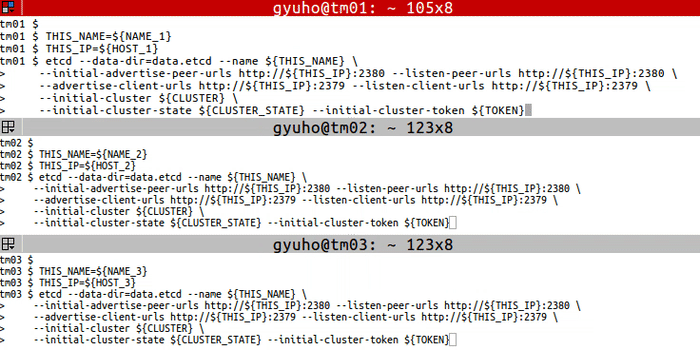
On each etcd node, specify the cluster members:
TOKEN=token-01 CLUSTER_STATE=new NAME_1=machine-1 NAME_2=machine-2 NAME_3=machine-3 HOST_1=10.240.0.17 HOST_2=10.240.0.18 HOST_3=10.240.0.19 CLUSTER=${NAME_1}=http://${HOST_1}:2380,${NAME_2}=http://${HOST_2}:2380,${NAME_3}=http://${HOST_3}:2380 Run this on each machine:
# For machine 1 THIS_NAME=${NAME_1} THIS_IP=${HOST_1} etcd --data-dir=data.etcd --name ${THIS_NAME} \ --initial-advertise-peer-urls http://${THIS_IP}:2380 --listen-peer-urls http://${THIS_IP}:2380 \ --advertise-client-urls http://${THIS_IP}:2379 --listen-client-urls http://${THIS_IP}:2379 \ --initial-cluster ${CLUSTER} \ --initial-cluster-state ${CLUSTER_STATE} --initial-cluster-token ${TOKEN} # For machine 2 THIS_NAME=${NAME_2} THIS_IP=${HOST_2} etcd --data-dir=data.etcd --name ${THIS_NAME} \ --initial-advertise-peer-urls http://${THIS_IP}:2380 --listen-peer-urls http://${THIS_IP}:2380 \ --advertise-client-urls http://${THIS_IP}:2379 --listen-client-urls http://${THIS_IP}:2379 \ --initial-cluster ${CLUSTER} \ --initial-cluster-state ${CLUSTER_STATE} --initial-cluster-token ${TOKEN} # For machine 3 THIS_NAME=${NAME_3} THIS_IP=${HOST_3} etcd --data-dir=data.etcd --name ${THIS_NAME} \ --initial-advertise-peer-urls http://${THIS_IP}:2380 --listen-peer-urls http://${THIS_IP}:2380 \ --advertise-client-urls http://${THIS_IP}:2379 --listen-client-urls http://${THIS_IP}:2379 \ --initial-cluster ${CLUSTER} \ --initial-cluster-state ${CLUSTER_STATE} --initial-cluster-token ${TOKEN} Or use our public discovery service:
curl https://discovery.etcd.io/new?size=3 https://discovery.etcd.io/a81b5818e67a6ea83e9d4daea5ecbc92 # grab this token TOKEN=token-01 CLUSTER_STATE=new NAME_1=machine-1 NAME_2=machine-2 NAME_3=machine-3 HOST_1=10.240.0.17 HOST_2=10.240.0.18 HOST_3=10.240.0.19 DISCOVERY=https://discovery.etcd.io/a81b5818e67a6ea83e9d4daea5ecbc92 THIS_NAME=${NAME_1} THIS_IP=${HOST_1} etcd --data-dir=data.etcd --name ${THIS_NAME} \ --initial-advertise-peer-urls http://${THIS_IP}:2380 --listen-peer-urls http://${THIS_IP}:2380 \ --advertise-client-urls http://${THIS_IP}:2379 --listen-client-urls http://${THIS_IP}:2379 \ --discovery ${DISCOVERY} \ --initial-cluster-state ${CLUSTER_STATE} --initial-cluster-token ${TOKEN} THIS_NAME=${NAME_2} THIS_IP=${HOST_2} etcd --data-dir=data.etcd --name ${THIS_NAME} \ --initial-advertise-peer-urls http://${THIS_IP}:2380 --listen-peer-urls http://${THIS_IP}:2380 \ --advertise-client-urls http://${THIS_IP}:2379 --listen-client-urls http://${THIS_IP}:2379 \ --discovery ${DISCOVERY} \ --initial-cluster-state ${CLUSTER_STATE} --initial-cluster-token ${TOKEN} THIS_NAME=${NAME_3} THIS_IP=${HOST_3} etcd --data-dir=data.etcd --name ${THIS_NAME} \ --initial-advertise-peer-urls http://${THIS_IP}:2380 --listen-peer-urls http://${THIS_IP}:2380 \ --advertise-client-urls http://${THIS_IP}:2379 --listen-client-urls http://${THIS_IP}:2379 \ --discovery ${DISCOVERY} \ --initial-cluster-state ${CLUSTER_STATE} --initial-cluster-token ${TOKEN} Now etcd is ready! To connect to etcd with etcdctl:
export ETCDCTL_API=3 HOST_1=10.240.0.17 HOST_2=10.240.0.18 HOST_3=10.240.0.19 ENDPOINTS=$HOST_1:2379,$HOST_2:2379,$HOST_3:2379 etcdctl --endpoints=$ENDPOINTS member list Access etcd

put command to write:
etcdctl --endpoints=$ENDPOINTS put foo "Hello World!" get to read from etcd:
etcdctl --endpoints=$ENDPOINTS get foo etcdctl --endpoints=$ENDPOINTS --write-out="json" get foo Get by prefix
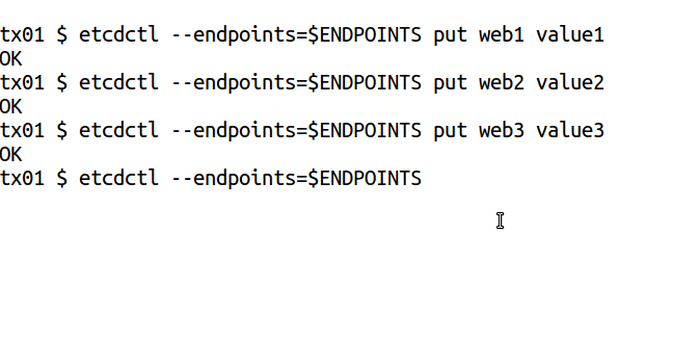
etcdctl --endpoints=$ENDPOINTS put web1 value1 etcdctl --endpoints=$ENDPOINTS put web2 value2 etcdctl --endpoints=$ENDPOINTS put web3 value3 etcdctl --endpoints=$ENDPOINTS get web --prefix Delete
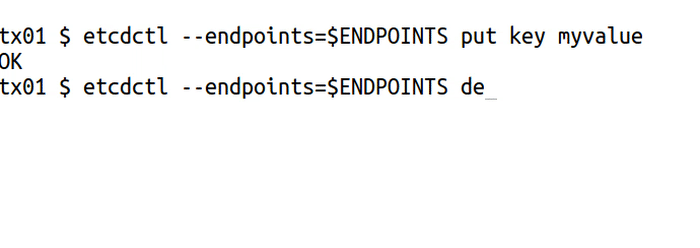
etcdctl --endpoints=$ENDPOINTS put key myvalue etcdctl --endpoints=$ENDPOINTS del key etcdctl --endpoints=$ENDPOINTS put k1 value1 etcdctl --endpoints=$ENDPOINTS put k2 value2 etcdctl --endpoints=$ENDPOINTS del k --prefix Transactional write
txn to wrap multiple requests into one transaction:
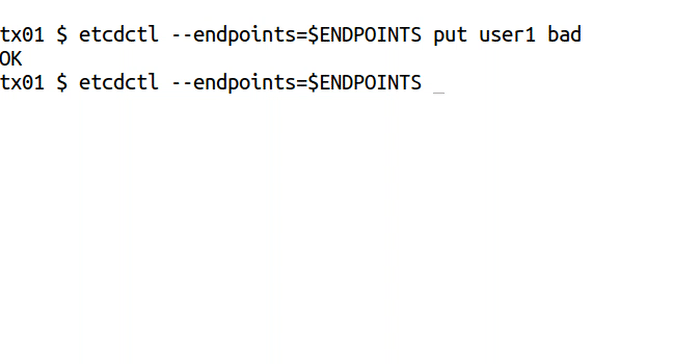
etcdctl --endpoints=$ENDPOINTS put user1 bad etcdctl --endpoints=$ENDPOINTS txn --interactive compares: value("user1") = "bad" success requests (get, put, delete): del user1 failure requests (get, put, delete): put user1 good Watch
watch to get notified of future changes:
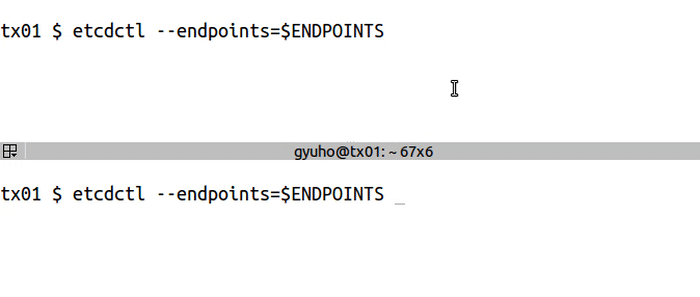
etcdctl --endpoints=$ENDPOINTS watch stock1 etcdctl --endpoints=$ENDPOINTS put stock1 1000 etcdctl --endpoints=$ENDPOINTS watch stock --prefix etcdctl --endpoints=$ENDPOINTS put stock1 10 etcdctl --endpoints=$ENDPOINTS put stock2 20 Lease
lease to write with TTL:
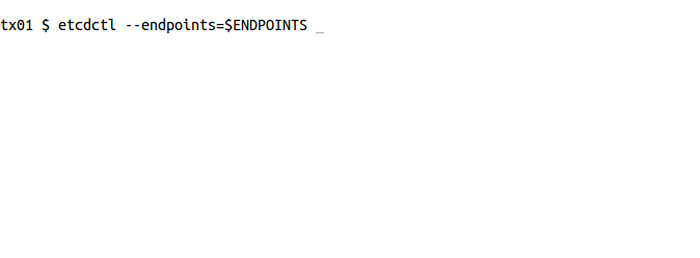
etcdctl --endpoints=$ENDPOINTS lease grant 300 # lease 2be7547fbc6a5afa granted with TTL(300s) etcdctl --endpoints=$ENDPOINTS put sample value --lease=2be7547fbc6a5afa etcdctl --endpoints=$ENDPOINTS get sample etcdctl --endpoints=$ENDPOINTS lease keep-alive 2be7547fbc6a5afa etcdctl --endpoints=$ENDPOINTS lease revoke 2be7547fbc6a5afa # or after 300 seconds etcdctl --endpoints=$ENDPOINTS get sample Distributed locks
lock for distributed lock:
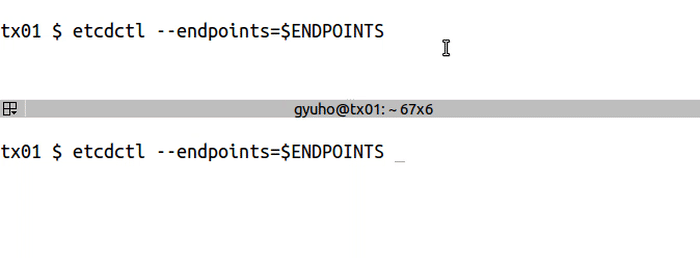
etcdctl --endpoints=$ENDPOINTS lock mutex1 # another client with the same name blocks etcdctl --endpoints=$ENDPOINTS lock mutex1 Elections
elect for leader election:
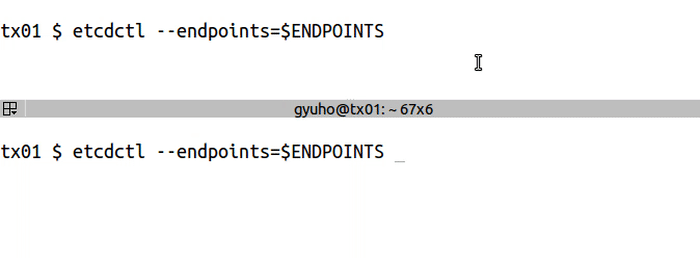
etcdctl --endpoints=$ENDPOINTS elect one p1 # another client with the same name blocks etcdctl --endpoints=$ENDPOINTS elect one p2 Cluster status
Specify the initial cluster configuration for each machine:
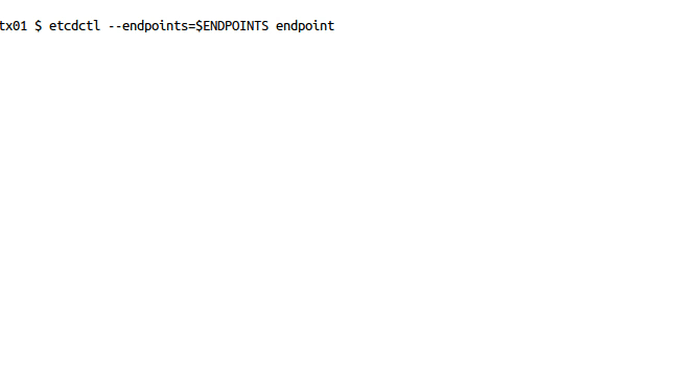
etcdctl --write-out=table --endpoints=$ENDPOINTS endpoint status +------------------+------------------+---------+---------+-----------+-----------+------------+ | ENDPOINT | ID | VERSION | DB SIZE | IS LEADER | RAFT TERM | RAFT INDEX | +------------------+------------------+---------+---------+-----------+-----------+------------+ | 10.240.0.17:2379 | 4917a7ab173fabe7 | 3.0.0 | 45 kB | true | 4 | 16726 | | 10.240.0.18:2379 | 59796ba9cd1bcd72 | 3.0.0 | 45 kB | false | 4 | 16726 | | 10.240.0.19:2379 | 94df724b66343e6c | 3.0.0 | 45 kB | false | 4 | 16726 | +------------------+------------------+---------+---------+-----------+-----------+------------+ etcdctl --endpoints=$ENDPOINTS endpoint health 10.240.0.17:2379 is healthy: successfully committed proposal: took = 3.345431ms 10.240.0.19:2379 is healthy: successfully committed proposal: took = 3.767967ms 10.240.0.18:2379 is healthy: successfully committed proposal: took = 4.025451ms Snapshot
snapshot to save point-in-time snapshot of etcd database:

etcdctl --endpoints=$ENDPOINTS snapshot save my.db Snapshot saved at my.db etcdctl --write-out=table --endpoints=$ENDPOINTS snapshot status my.db +---------+----------+------------+------------+ | HASH | REVISION | TOTAL KEYS | TOTAL SIZE | +---------+----------+------------+------------+ | c55e8b8 | 9 | 13 | 25 kB | +---------+----------+------------+------------+ Migrate
migrate to transform etcd v2 to v3 data:
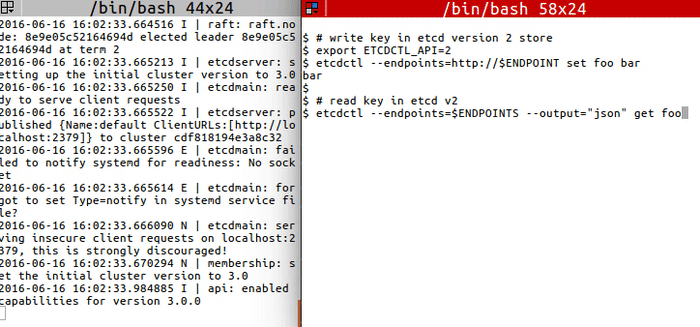
# write key in etcd version 2 store export ETCDCTL_API=2 etcdctl --endpoints=http://$ENDPOINT set foo bar # read key in etcd v2 etcdctl --endpoints=$ENDPOINTS --output="json" get foo # stop etcd node to migrate, one by one # migrate v2 data export ETCDCTL_API=3 etcdctl --endpoints=$ENDPOINT migrate --data-dir="default.etcd" --wal-dir="default.etcd/member/wal" # restart etcd node after migrate, one by one # confirm that the key got migrated etcdctl --endpoints=$ENDPOINTS get /foo Member
member to add,remove,update membership:
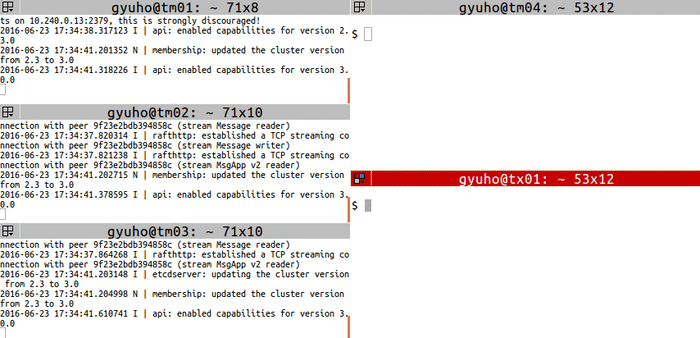
# For each machine TOKEN=my-etcd-token-1 CLUSTER_STATE=new NAME_1=etcd-node-1 NAME_2=etcd-node-2 NAME_3=etcd-node-3 HOST_1=10.240.0.13 HOST_2=10.240.0.14 HOST_3=10.240.0.15 CLUSTER=${NAME_1}=http://${HOST_1}:2380,${NAME_2}=http://${HOST_2}:2380,${NAME_3}=http://${HOST_3}:2380 # For node 1 THIS_NAME=${NAME_1} THIS_IP=${HOST_1} etcd --data-dir=data.etcd --name ${THIS_NAME} \ --initial-advertise-peer-urls http://${THIS_IP}:2380 \ --listen-peer-urls http://${THIS_IP}:2380 \ --advertise-client-urls http://${THIS_IP}:2379 \ --listen-client-urls http://${THIS_IP}:2379 \ --initial-cluster ${CLUSTER} \ --initial-cluster-state ${CLUSTER_STATE} \ --initial-cluster-token ${TOKEN} # For node 2 THIS_NAME=${NAME_2} THIS_IP=${HOST_2} etcd --data-dir=data.etcd --name ${THIS_NAME} \ --initial-advertise-peer-urls http://${THIS_IP}:2380 \ --listen-peer-urls http://${THIS_IP}:2380 \ --advertise-client-urls http://${THIS_IP}:2379 \ --listen-client-urls http://${THIS_IP}:2379 \ --initial-cluster ${CLUSTER} \ --initial-cluster-state ${CLUSTER_STATE} \ --initial-cluster-token ${TOKEN} # For node 3 THIS_NAME=${NAME_3} THIS_IP=${HOST_3} etcd --data-dir=data.etcd --name ${THIS_NAME} \ --initial-advertise-peer-urls http://${THIS_IP}:2380 \ --listen-peer-urls http://${THIS_IP}:2380 \ --advertise-client-urls http://${THIS_IP}:2379 \ --listen-client-urls http://${THIS_IP}:2379 \ --initial-cluster ${CLUSTER} \ --initial-cluster-state ${CLUSTER_STATE} \ --initial-cluster-token ${TOKEN} Then replace a member with member remove and member add commands:
# get member ID export ETCDCTL_API=3 HOST_1=10.240.0.13 HOST_2=10.240.0.14 HOST_3=10.240.0.15 etcdctl --endpoints=${HOST_1}:2379,${HOST_2}:2379,${HOST_3}:2379 member list # remove the member MEMBER_ID=278c654c9a6dfd3b etcdctl --endpoints=${HOST_1}:2379,${HOST_2}:2379,${HOST_3}:2379 \ member remove ${MEMBER_ID} # add a new member (node 4) export ETCDCTL_API=3 NAME_1=etcd-node-1 NAME_2=etcd-node-2 NAME_4=etcd-node-4 HOST_1=10.240.0.13 HOST_2=10.240.0.14 HOST_4=10.240.0.16 # new member etcdctl --endpoints=${HOST_1}:2379,${HOST_2}:2379 \ member add ${NAME_4} \ --peer-urls=http://${HOST_4}:2380 Next, start the new member with --initial-cluster-state existing flag:
# [WARNING] If the new member starts from the same disk space, # make sure to remove the data directory of the old member # # restart with 'existing' flag TOKEN=my-etcd-token-1 CLUSTER_STATE=existing NAME_1=etcd-node-1 NAME_2=etcd-node-2 NAME_4=etcd-node-4 HOST_1=10.240.0.13 HOST_2=10.240.0.14 HOST_4=10.240.0.16 # new member CLUSTER=${NAME_1}=http://${HOST_1}:2380,${NAME_2}=http://${HOST_2}:2380,${NAME_4}=http://${HOST_4}:2380 THIS_NAME=${NAME_4} THIS_IP=${HOST_4} etcd --data-dir=data.etcd --name ${THIS_NAME} \ --initial-advertise-peer-urls http://${THIS_IP}:2380 \ --listen-peer-urls http://${THIS_IP}:2380 \ --advertise-client-urls http://${THIS_IP}:2379 \ --listen-client-urls http://${THIS_IP}:2379 \ --initial-cluster ${CLUSTER} \ --initial-cluster-state ${CLUSTER_STATE} \ --initial-cluster-token ${TOKEN} Auth
auth,user,role for authentication:
export ETCDCTL_API=3 ENDPOINTS=localhost:2379 etcdctl --endpoints=${ENDPOINTS} role add root etcdctl --endpoints=${ENDPOINTS} role get root etcdctl --endpoints=${ENDPOINTS} user add root etcdctl --endpoints=${ENDPOINTS} user grant-role root root etcdctl --endpoints=${ENDPOINTS} user get root etcdctl --endpoints=${ENDPOINTS} role add role0 etcdctl --endpoints=${ENDPOINTS} role grant-permission role0 readwrite foo etcdctl --endpoints=${ENDPOINTS} user add user0 etcdctl --endpoints=${ENDPOINTS} user grant-role user0 role0 etcdctl --endpoints=${ENDPOINTS} auth enable # now all client requests go through auth etcdctl --endpoints=${ENDPOINTS} --user=user0:123 put foo bar etcdctl --endpoints=${ENDPOINTS} get foo # permission denied, user name is empty because the request does not issue an authentication request etcdctl --endpoints=${ENDPOINTS} --user=user0:123 get foo # user0 can read the key foo etcdctl --endpoints=${ENDPOINTS} --user=user0:123 get foo1 # permission denied, user0 does not have roles which can read foo1 Feedback
Was this page helpful?
Glad to hear it! Please tell us how we can improve.
Sorry to hear that. Please tell us how we can improve.